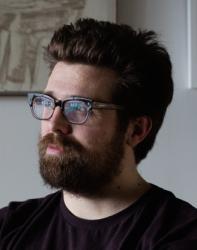
This month, Pushkin Press and Grove Atlantic will be publishing ‘Hotel Silence’, Icelandic author and playwright Auður Ava Ólafsdóttir’s third novel to appear in English, and her fifth overall. Upon its publication in 2016, the book won the Icelandic Literature Prize. More recently it was also nominated for the Nordic Council Literature Prize, and named as one of the ten best novels to look out for in 2018 by The Independent.
Currently, Auður is readying herself for going out into the world to present the novel to its new readers. “When a book leaves home it needs to find its own way but sometimes the author follows behind to talk about it,” she jokes. “My measure of when a book is finished is whether it has become a stranger to me; as if it was written by someone else. At that point, I turn into a reader and have no more means of accessing the book than anyone else.” She smiles. “If a book was a person it would be a better person than I am.”

Sympathy for the lost
The novel’s protagonist is one Jónas Ebeneser, a middle-aged, divorced handyman who is contemplating suicide after discovering he is not his daughter’s biological father. In a vain attempt to not cause undue trauma to his daughter, he decides to travel overseas to complete the act—preferably to a war-torn country that is already all too familiar with death. However, at the last minute, worried that he might need to install a ceiling hook in his hotel room to hang himself properly, he packs a drill and his toolbox (“the smaller one”) for his one-way trip.
“I like to write about abnormal normal people,” Auður says of the stoic Jónas. “My protagonists are often people who find themselves in impossible situations, who are lost, but trying to find their way.”
Language vs. physicality
Jónas’s abilities as a handyman—he is capable of installing kitchens and aligning doors—form a major theme of the novel. It’s a characteristic that Auður says epitomises traditional aspects of Icelandic masculinity.
“Both my grandfathers were craftsmen,” she says. “One was a blacksmith and the other a coffin maker. Still, I felt as if I was writing against cliché. Today, men who portray that sort of masculinity in literature and film are usually depicted as losers. You know: antisocial, middle-aged average Joes, living alone and not washing their hair.”
For Auður Ava, that’s not what Jónas is about. “He’s quiet, but my characters are often quiet; male or female,” she says. “I like substituting language with physicality. Touch, skin, flesh and scars all play significant roles in ‘Hotel Silence’. For the characters, silence is a remedy that can heal their scars.”

A world with meaning
The destination that Jónas chooses for his suicide is never specified, but has an eerie familiarity to it. It’s an ‘anyplace’ that we’ve seen on countless news reports; a country haunted by the trauma of war.
“There’s usually a certain absence of time and place in my books,” Auður admits. “If something is ‘nowhere’, that also means that it’s ‘everywhere’, and perhaps even ‘anytime.’ Even though people in the Western world prefer watching their wars on TV rather than outside their windows, I always think: this might just as well be us. We are the others. I agree with Ragnar Kjartansson when he says in one of his artworks: ‘It’s beautiful but sad to be a human being.’ By writing fiction, I’m struggling to create a world that contains some deeper meaning of what it is to be human.”
“Humanity is the same everywhere,” she continues. “There’s love everywhere and always. The book asks questions like: How fragile is a human body? How do we use words? How do we justify ourselves through our actions? Is there anything we can do to mend or ‘fix’ the world? I don’t think the way to find happiness is through the type of self-centeredness that “finding yourself” implies, like the self-help books promise you. Who is this fixed and eternal ‘self’ supposed to be? Thank God that we can’t help changing and evolving throughout our lives. That dialogue between a former self and a present self is one of the themes of the book.”

Alternative realities and time travel
While being filled with poetic language as well as black humour, Auður Ava’s work often contains an undertone of the political. Hearing her speak of fiction and art, it’s clear that she has a profound belief in the ability of both to connect people and cultures in a way that nothing else can.
“I suppose I’m driven by that childish notion of wanting to influence the world,” she concludes. “It’s almost like wanting to tidy things up. Organize the chaos. Create an alternative reality that has meaning. I can do that by telling a story. But writing is also a means of manipulating time. You can only write one sentence at a time, while the world is happening simultaneously all around you. A novel is an organized approximation of reality, and everything that goes into a novel unavoidably has meaning. There’s no such thing as innocent fiction.”
Read more about Icelandic literature here.
Buy subscriptions, t-shirts and more from our shop right here!

















